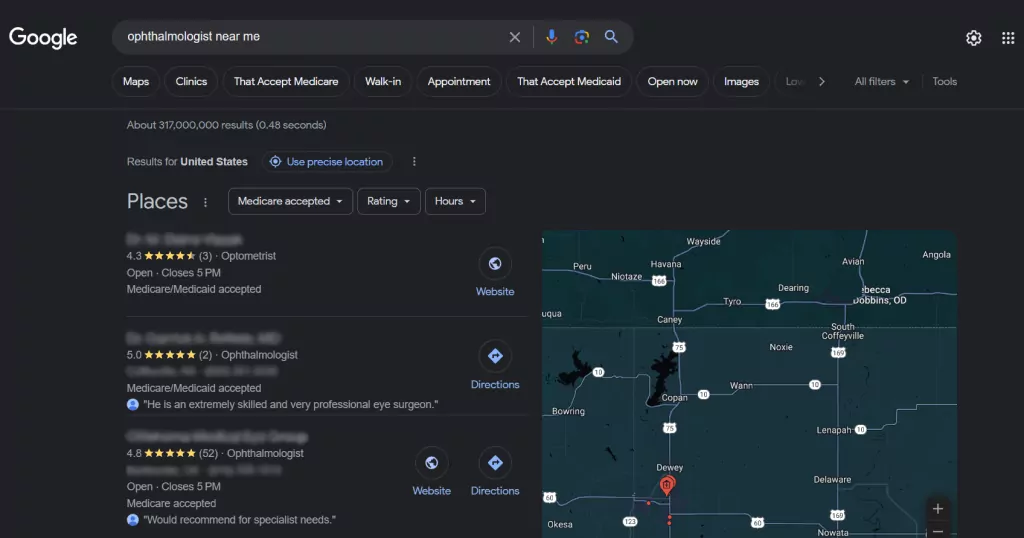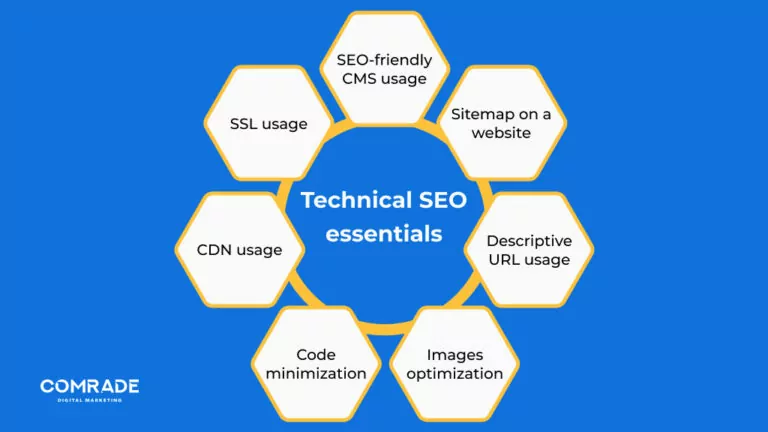Many people spend most of their time in front of different screens, like watching their favorite TV show or searching online for an ophthalmologist for themselves or their loved ones. In fact, over 80% of patients use search engines like Google and Bing to find healthcare providers, meaning your website’s placement in results could impact whether potential patients even know you exist.
This reliance on digital tools means those wanting to grow their business can no longer overlook search engine optimization. Taking steps to improve a practice website’s visibility is a necessity. Making small adjustments with the end user in mind can allow ophthalmologists to welcome more people who may need their services. The following tips cover foundational SEO strategies that any ophthalmologist can implement.

1. Build a Local SEO Presence
Potential patients always search for eye doctors close to home. Local searches are how many people find physicians for appointments and care. If your practice does not appear prominently in local search results, you risk missing this influx of new patients.

60% of clients call businesses from the search engines using the call button. Local SEO strategies help ophthalmologists tap into this local search traffic. Not optimizing for local search could leave money on the table as patients select other nearby practices instead.
Your practice website must convey a strong local presence and contain your practice’s name, address, and phone number (NAP) consistently across all pages. You should also claim and optimize your online listings on platforms like Google My Business, Yelp, and Healthgrades. This ophthalmology SEO strategy will help your practice appear in local search results and provide patients with important information about your practice.
Specific keyword targeting of the local community brings more relevant patients to your site. Furthermore, focus on creating high-quality, relevant content on your website that addresses the needs of your local patient community.
2. Identify Target Keywords for Ophthalmologists
Keyword research helps ophthalmologists optimize site content addressing patient needs. Search terms reflect why people seek eye doctors – from cataract exams to glaucoma treatments. Understanding common queries facilitates content answering patient questions while attracting search traffic.
Numerous tools, such as Google Keyword Planner, SEMrush, and Ahrefs, are available to assist you in keyword research. These tools provide valuable insights into search volume, competition, and cost-per-click (CPC) for different keywords.
When selecting keywords, consider using long-tail, more specific, and less competitive than general keywords. So, rather than using a broad keyword like “eye doctor,” you could use a long-tail keyword such as “ophthalmologist for retinal issues in Houston” to capture specificity.
SEO Keywords for Eye Doctors [Examples]
| Keyword | KD | Volume |
| eye doctor near me | Medium | 413K |
| optometrist near me | Medium | 104K |
| eye doctor | Hard | 72K |
| eye exam near me | Hard | 68K |
| eye care center | Low | 25K |
| eye dr near me | Medium | 21K |
| eye care near me | Hard | 16K |
| eye clinic near me | Medium | 13K |
| family eye care | Low | 11K |
| eye specialist near me | Medium | 6.1K |
| eye specialist | Medium | 5.0K |
3. Optimize Your Ophthalmology Website for SEO
Your website is often the first point of contact between your practice and potential patients, so it’s important to make a strong impression and provide a seamless user experience.
When it comes to ophthalmology website design optimization, there are several key aspects to focus on. First, your website should be mobile-friendly and easy to navigate, with clear menus and concise language that helps patients find the necessary information. Second, your website should be optimized for speed, with fast load times and minimal lag. This can be achieved through techniques like compressing images, minifying code, and using a content delivery network (CDN).

Another important aspect of website optimization is search engine optimization (SEO). This involves optimizing your website’s content and structure to rank higher in search engine results for relevant keywords. This can be achieved through keyword-rich titles and meta descriptions, creating high-quality backlinks from other reputable websites, and using header tags to structure your content.
Furthermore, regularly update your website with fresh and relevant content to keep patients engaged and attract new visitors. This can include blog posts, news articles, patient resources, and information about your practice and the services you offer.
4. Build Quality Backlinks in Ophthalmology SEO
Acquisition of relevant backlinks improves visibility within search algorithms. They signal to Google and other search engines that your website is credible and authoritative, which can improve your visibility in SERPs. The more high-quality backlinks you have, the higher your website will rank in search engine results pages (SERPs).

There are several strategies you can employ to build quality backlinks:
- Guest posting: Write and publish articles on reputable websites in your industry and include a link back to your own website.
- Broken link building: Find broken links on other websites and contact the site owners to suggest your content as a replacement.
- Resource pages: Identify resource pages in your industry and request that your website be included.
- Directories and listings: Submit your website to relevant directories and listings, such as Google My Business and Yelp.
- Social media: Share your content on social media platforms and encourage your followers to share it.
Comrade Digital Marketing Agency can help you with the above if you’re unsure how to go about it. Schedule a free consultation.
5. On-Page SEO Best Practices for Ophthalmologists
On-page SEO is the process of optimizing individual web pages to rank higher and earn more relevant web traffic in search engines. It encompasses easily implementable strategies that improve search engine and user content efficacy. It involves optimizing elements on your website, such as content, titles, descriptions, headings, and meta tags. On-page optimization can help your practice rank higher in search engine results pages (SERPs) and attract more patients.

But what are the best practices for on-page optimization?
- Use relevant keywords in your page titles and headings. Make sure your page titles and headings accurately reflect the content of your pages and include relevant keywords.
- Write high-quality, informative content. Your content should be well-written, informative, and engaging. It should also be relevant to your target audience and provide value.
- Optimize your images. Use descriptive filenames for your images and include alt tags to help search engines understand what the images are about.
- Use internal links. Link to other relevant pages on your website to help users navigate your site and to distribute link equity.
- Optimize your URL structure. Keep your URLs short, descriptive, and easy to read.
- Use structured data markup. Use structured data markup to help search engines understand the content of your pages and display rich snippets in Google search results.
- Optimize your page speed. A slow-loading website can negatively impact your search engine rankings. Use tools like Google PageSpeed Insights to identify areas for improvement and implement recommended optimizations.
6. Off-Site SEO Strategies for Ophthalmology Practices
Off-site SEO expands search engine optimization efforts beyond a practice’s website. External links and citations are especially influential signals used by search engines to determine a site’s relevance and importance within its specialty. Gaining quality backlinks takes ongoing, strategic work but pays strong dividends in search rankings and new patient leads over time.
Citations, on the other hand, are references to a business’s name, address, and phone number (NAP) on other websites and directories. Consistently providing up-to-date, complete information about services, experience, and credentials on listings like Google My Business, HealthGrades, and others helps to establish your online presence and improve your local search rankings. These citations become clickable links directing patients to the practice site.
7. Technical SEO Essentials for Ophthalmologists
Technical SEO focuses on the underlying architecture of a website to optimize it for search engine functionality. Search engines are programmatic, analyzing site speed, format structure, and coding methods to understand a page’s content and credibility. Small adjustments to technical aspects make the all-important search bots better able to comprehensively “read” a practice’s web presence, increasing the chances patients find the site.

In simpler terms, technical SEO focuses on the behind-the-scenes aspects of a website that impact its search engine rankings. There are several key practices that you can implement to optimize your website’s technical SEO.
For a seamless experience, you should:
- Use a content management system (CMS) that is SEO-friendly. A CMS like WordPress or Drupal can help you easily manage your website’s content and optimize it for search engines.
- Create a sitemap and submit it to Google Search Console. A sitemap is a file that lists all the pages on your website. Submitting it to Google Search Console helps Google to index your website more effectively.
- Use descriptive URLs. Your URLs should be short, descriptive, and easy to read.
- Optimize your images. Use descriptive filenames for your images and include alt tags to help search engines understand what the images are about.
- Minify your code. Minifying your code can help to reduce the size of your web pages and improve their loading speed.
- Use a CDN (content delivery network). A CDN can help improve your website’s speed by delivering your content from servers located closer to your users.
- Implement SSL (Secure Sockets Layer). SSL helps encrypt the data transmitted between your website and your users’ browsers. This can help to protect your users’ privacy and improve your website’s security.
8. Measure and Analyze SEO Results for Ophthalmologists
Measuring and analyzing your SEO results allows you to understand what’s working and what’s not so you can continue to improve and grow your online presence. You’ll be left guessing and wasting valuable time and resources without proper data analysis.
Some important SEO metrics to track include organic traffic, keyword rankings, bounce rate, click-through rate (CTR), conversion rate, and engagement metrics like time on page and pages per session.
Various tools are available to assist you in tracking and analyzing your SEO performance. Some popular options include Google Analytics, Google Search Console, SEMrush, and Ahrefs. These tools provide detailed insights into website traffic, keyword rankings, backlinks, and other crucial SEO metrics.
Navigate the Ophthalmology SEO with Comrade
While patient care always comes first, search optimization is a worthwhile investment for any ophthalmology practice serious about its online future. This guide covered fundamental tactics for exceptional search optimization in your field. Implementing a multifaceted SEO approach, including local search engine optimization, link building, technical website checks, and continuous analysis, will elevate your practice’s authority and visibility online over time.
Since these SEO strategies require effort, partnering with experienced ophthalmology SEO services gives you more time to focus on patient care. Why not let Comrade Digital Marketing Agency take control of the SEO aspect so you can dedicate maximum energy to vision care? Our team designs custom strategic plans suitable for your practice and its goals of attracting new patients, among other things.
Contact us now to get started on your Ophthalmology SEO journey with Comrade!

